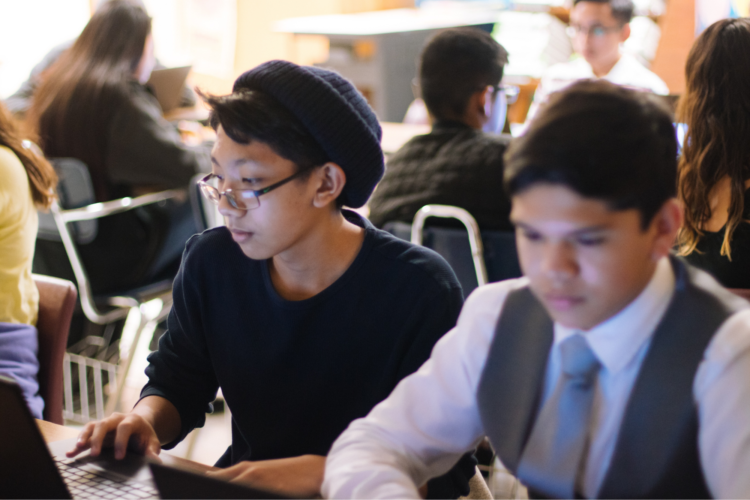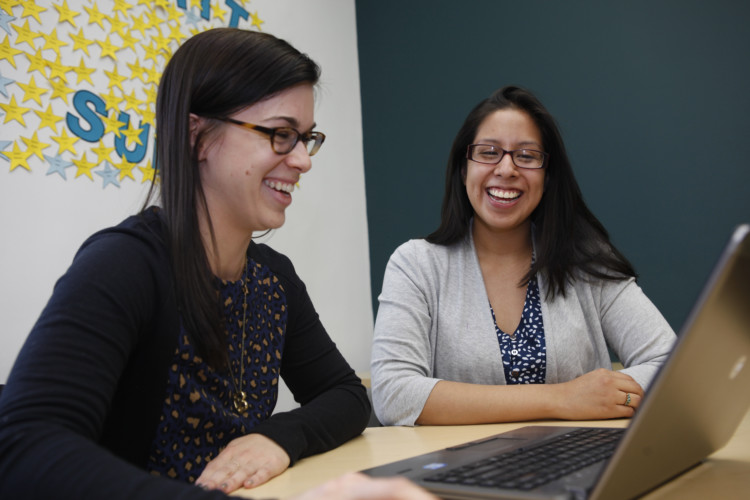We are proud to announce six new research grants, totaling over $3 million, in support of five studies on ways to reduce inequality in youth outcomes and one study on strategies for improving the use of research evidence in ways that benefit young people. Approved at the most recent meeting of the Foundation’s Trustees, these grants will help build theory and empirical evidence in our two focus areas.
Among the grants focused on reducing inequality are studies investigating the impacts of restorative justice practices on youth outcomes; how peer coaching might benefit Latinx and Black middle-school youth referred for disruptive behavior; whether a game-based learning environment can improve Spanish-speaking students’ science literacy; how asset-based pedagogy can shape Black and Latinx students’ belonging and academic development; and the associations between racial literacy, teaching practices, and student literacy outcomes.
In their study in the improving the use of research evidence focus area, Max Crowley and Taylor Scott will build on previous work evaluating the Research-to-Policy Collaboration model at the federal level to determine whether the model can improve the use of prevention research in state policymaking.
“These five studies will greatly contribute to our understanding of how asset-based, non-punitive, and culturally-relevant approaches can help improve students’ educational outcomes. We are excited to see how these studies will deepen our knowledge of ways to reduce inequality among young people in the United States,” said Senior Program Officer Jenny Irons, who oversees grants in the reducing inequality focus area.
“The Research-to-Policy Collaboration model has made tremendous strides in fostering relationships between legislators and researchers to improve evidence use in federal policymaking. This study will help illuminate how the model might translate at the state level to address substance use among youth,” said Program Officer Anupreet Sidhu, who oversees grants on improving the use of research evidence.
Focus Area: Reducing Inequality
Transformative Justice in Schools: Unraveling the Impacts of Restorative Practices on Youth Outcomes and Inequality
Do restorative justice practices reduce racial inequalities in graduation, criminal justice system involvement, and post-secondary outcomes, and if so, how?
Anjali Adukia, University of Chicago; Benjamin Feigenberg, University of Illinois-Chicago
11/1/2024—10/31/2027, $541,730
Black and Latinx students are disproportionately more likely to be suspended or expelled from school than White students. Further, studies have shown that attending schools with stricter disciplinary policies can lead to adverse long-term outcomes, including lower educational attainment and higher chances of incarceration. Restorative justice practices, which focus on repairing harm and building community, have shown promise in creating a safe school environment that promotes belonging and learning. Building on prior research that found restorative justice practices in Chicago Public Schools (CPS) reduced both exclusionary discipline overall and racial disparities in short-term outcomes, this study will examine the longer-term impacts of these practices, as well as whether positive effects spill over to students’ younger siblings. The team will use student-level two-way fixed effects models to examine the impact of restorative practices exposure on high school graduation, postsecondary enrollment and completion, and criminal legal involvement, and examine how this varies by race, gender, and restorative practice approach. The team also plans to collect supplemental qualitative data from focus groups and interviews with students, restorative practice coaches, and school staff to explore perspectives on the quantitative . Through the use of innovative methods, the team will comment on the reach and the longevity of an intervention found to reduce racial inequalities in a prior study.
Empowering Latinx and Black Youth with School Discipline Referrals as Peer Coaches
How does training in peer coaching benefit Latinx and Black middle-school youth referred for disruptive behavior?
Stanley Huey and Adrian Huerta, University of Southern California; Colleen Halliday, University of South Carolina
7/1/2025–6/30/2028, $599,997
Latinx and Black youth are more likely to experience exclusionary discipline compared to their White peers, with immediate and long-term consequences for academic achievement and social well-being. In part, disparities in exclusionary discipline are due to small initial differences in social perception and interactions, which intensify over time as negatively stereotyped students and their teachers react to one another. Prior pilot work suggests that Peer Coach Training (PCT), an approach that deemphasizes student misbehavior and focuses instead on training youth as “coaches” to help their peers, may help increase prosocial behavior and positive teacher perceptions for youth with disciplinary referrals. Using a proof-of-concept approach, Huey and colleagues will build on promising early findings by conducting a small randomized controlled trial of ten charter schools across Los Angeles County, with 150 Black and Latinx middle school student participants who have received at least one disciplinary referral. The team will use multi-level models to assess the potential of the intervention to influence student behavioral and discipline outcomes, as well as the extent to which helping behaviors, psychological empowerment, and teacher perceptions of student behavior may explain effects. They will then conduct in-depth interviews with students and teachers to better understand the mechanisms through which the intervention may yield positive effects. Findings will provide insight into a novel strengths-based approach to reducing inequalities for Black and Latinx youth.
An Educational Game to Support Multilingual Learners’ Reading Comprehension and Science Learning
How can a game-based learning environment improve 5th grade Spanish-speaking students’ science learning?
John Nietfeld and Maria Coady, North Carolina State University; Rayne Sperling, Pennsylvania State University
1/1/2025–12/31/2027, $599,413
Multilingual students, especially Spanish-speaking students, are underrepresented in STEM pathways. One contributing factor is a gap in science literacy, or the skills necessary for science comprehension and the motivation to engage with scientific content, between multilingual learners and peers whose first language is English. Technological tools can be a valuable way to support scientific learning, especially given increasing demands on teachers and decreased time dedicated to science in elementary school. This study will adapt and examine Missions with Monty, an online game-based learning environment that has shown promise in improving reading comprehension and science learning for Spanish-speaking students. Nietfeld and colleagues will work with students in eight schools across five counties in North Carolina to iteratively develop and examine language scaffolds that incorporate culturally-relevant characters and examples, as well as translation options, into the game. The team will conduct a quasi-experimental study to compare three versions of the game with different types of scaffolds on scientific learning and reading comprehension. They will also conduct post-study interviews with participating students. Findings will shed light on the promise of a technological tool for improving scientific learning outcomes for multilingual students whose primary language is Spanish.
Fostering Belonging in School for Black and Latinx Students: The Pathway from Teachers’ Professional Learning on Asset-based Pedagogy to Students’ Social-Emotional Experiences
How does teachers’ professional learning about asset-based pedagogy shape Black and Latinx students’ belonging and academic development in different district contexts?
Shanette Porter and Camille Farrington, Chicago Consortium, University of Chicago; Francesca López, Pennsylvania State University; Deborah Rivas-Drake, University of Michigan
11/1/2024–10/31/2027, $399,996
Research shows that Black and Latinx students disproportionately experience lower feelings of belonging in school compared to White peers, with negative consequences for their academic trajectories. School districts are increasingly turning to asset-based pedagogy (ABP), which leverages students’ cultural identities and experiences as educational strengths, to more equitably support students’ sense of belonging. This study will examine how incorporating a validated student survey into APB shapes teacher practices, knowledge, and beliefs in ways that improve student belonging and learning. The team will collect and analyze quantitative data on teachers’ utilization and experiences of ABP professional learning, resources, and supports, as well as shifts in teachers’ practices. They will also use regression analysis to examine the descriptive relationships between ABP professional learning, teachers’ identity-affirming practices and beliefs, and student belonging and grades. By conducting this work in partnership with Chicago Public Schools (CPS) and the Tucson Unified School District (TUSD), the team will advance theory on the mechanisms through which asset-based pedagogy improves belonging and learning for Black and Latinx students.
Measuring the Role of Racial Literacy in Promoting Equitable Reading Instruction through the 3Rs
How can racial literacy be developed and measured, and how is it associated with culturally informed teaching practices and student reading outcomes?
Caitlin Spear, Shallegra Moye, and Shannon Wanless, University of Pittsburgh
11/1/2024–10/31/2027, $648,527
Disparities in early reading have profound consequences for children’s life trajectories, especially for Black students. Teachers’ racial literacy, the skills and practices by which teachers understand and navigate the impacts of race and racism in the classroom, is a potential critical lever for reducing inequality in education. Despite a strong theoretical base, there is a dearth of research around the measurement of racial literacy. The proposed project builds on an innovative literacy initiative, the 3Rs (Reading, Racial Equity, Relationships), a system-based program that aims to improve early literacy outcomes, particularly for Black students, that uses high-quality racially affirming picture books within communities of practice to develop teachers’ racial literacy and promote equitable reading practices. The team will use a three-year, mixed-method multi-phase study to test existing theories of racial literacy and examine its associations with teaching practices and student literacy outcomes. Findings will provide a well-theorized and quantitatively tested measure of racial literacy, whose links to practice and student outcomes can be tested systematically in future research.
Focus Area: Improving the Use of Research Evidence
States as Laboratories: Experimental Trial of the Research-to-Policy Collaboration to Improve States’ Use of Evidence to Benefit Youth
Does the research-to-policy collaboration model improve policymakers’ use of prevention science research at the state level?
Daniel Crowley and J. Taylor Bishop Scott, Edna Bennett Pierce Prevention Research Center, Pennsylvania State University
11/1/2024–10/31/2025, $200,000
Substance use remains one of the most preventable sources of morbidity and mortality, yet the majority of youth continue to not have access to evidence-based prevention services. While policies can reduce population-level substance misuse, only about a quarter of all prevention-oriented bills explicitly reference evidence-based strategies over the last decade. Findings from recent research have demonstrated the effectiveness of the Research-to-Policy Collaboration (RPC) model for improving research use at the federal level, but evidence of impact on state initiatives remains limited. Crowley and colleagues will leverage a recently funded study by National Institute on Drug Abuse and experimentally evaluate whether the RPC model can improve the use of prevention research in state policymaking. This mixed-methods study will map the state-level policy landscape through qualitative interviews, bill coding, and legislative surveys to assess and quantify value, awareness, and use of substance use prevention research. The findings from this study will reveal whether a state-level knowledge mobilization infrastructure impacts research use in state policymaking, while also addressing substance use among youth and increasing access to evidence-based prevention programs.






